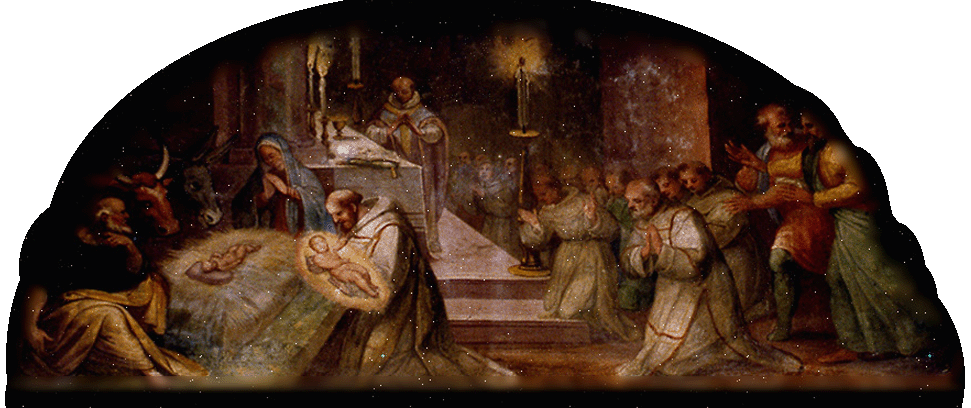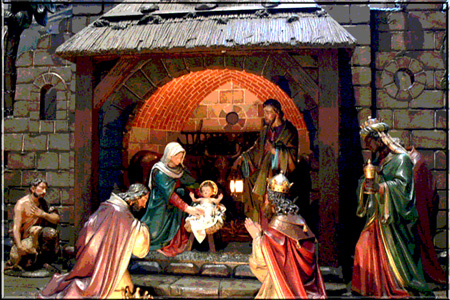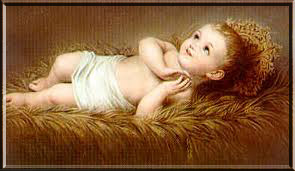
 by Johannes Jergensen, 1914
Devotion to the crib or creche is no doubt of very ancient origin; but it remained for St. Francis of Assisi to popularize it and to give it the tangible form in which it is known at the present time. When St. Francis visited Rome in 1223, he made known to Pope Honorius III. the plans he had conceived of making a scenic representation of the place of the Nativity. The pope listened gladly to the details of the project and gave it his sanction.
Since that time devotion to the crib has spread over the entire world. Every year these representations of Christ's birth-place are erected, and to them the faithful come on Christmas morn to adore their new born King. Many children and adults have thus been easily instructed in regard to the Nativity. For the same reason cribs (creches) are set up in private houses.
In the year 1223, Francis himself celebrated Christmas in a way the world
had never seen the match of. In Greccio, he had a friend and well-wisher,
Messer John Vellita, who had given him and his Brothers a wood-grown cliff
up above Greccio, for them to live there. Francis now had this man called to
Colombo and said to him: "I want to celebrate the holy Christmas night along
with thee, and now listen, how I have thought it out for myself.
Prayer To St. FrancisIn the woods by the cloister thou wilt find a cave, and there mayest arrange a manger filled with hay. There must also be an ox and an ass, just as in Bethlehem. I want for once to celebrate seriously the coming of the Son of God upon earth and see with my own eyes how poor and miserable he wished to be for our sakes." John Vellita looked after all of Francis' wishes, and at midnight of Christmas Eve the Brothers came together to celebrate the festival of Christmas. All carried lighted torches, and around the manger the Brothers stood with their candles, so that it was light as the day under the dark vaulting of the rocks. Mass was read over the manger as the altar, so that the Divine Child under the forms of bread and wine should himself come to the place, as bodily and discernibly he had been in the stable of Bethlehem. For a moment it seemed to John Vellita that he saw a real child lying in the manger, but as if dead or sleeping. Then Brother Francis stepped forward and took it lovingly in his arms, and the Child smiled at Francis, and with his little hands stroked his bearded chin and his coarse grey habit. And yet this vision did not astonish Messer Giovanni (John). For Jesus had been dead or else asleep in many hearts, but Brother Francis had by his voice and his example again resorted the Divine Child to life and awakened it from its trance. As the Gospel was now sung, Francis stepped forward in his deacon's vestments. "Deeply sighing, overcome by the fullness of his devotion, filed with a wonderful joy, the holy one of God stood by the manger," says Thomas of Celano. "And his voice, his strong voice, and glad voice, clear voice and ringing voice invited all to seek the highest good." Brother Francis preached on the Child Jesus. "With words that dripped with sweetness, he spoke of the poor King who is born in the night, and who is the Lord Jesus in the city of David. And every time he would name the name of Jesus, the fire of his love overcame him, and he called him instead the Child from Bethlehem. And the word Bethlehem he said with a sound as if of a lamb that bleats, and when he had named the name of Jesus, he let his tongue glide over his lips as if to taste the sweetness this name had left there as it passed over them. The holy watch-night only ended late, and every one went with joy to their homes. "But later the place where the manger stood was dedicated to the Lord for a temple, and over the manger an altar was erected to the honor of our blessed Father Francis, so that where the dumb animals formerly ate hay out of the manger, there men now receive the spotless lamb, our Lord Jesus Christ, for the salvation of their soul and body, he who in unspeakable love gave His Blood for the life of the world, and who with the Father and the Holy Ghost in eternal divine glory lives and rules for ever and ever. Amen."
O Seraphic Father St. Francis! I revere in thee the living image of Christ crucified. Born like Him in a stable, thou didst contemn a world which rejected thee; poor like Him, thou didst esteem no possessions but those which are eternal; meek and humble like Him, thou didst count confusion and humiliation a joy; inflamed with an ardent charity, thou didst burn to increase His glory; thy love transformed thy whole life into one long martyrdom, and made thee strive by penitential works to satisfy the ardor of thy desires, until at last it impressed on thy body the Wounds it had long before engraved deeply on thy heart, and made thee a living crucifix preaching sweetly to men the sufferings and love of Jesus.
Obtain for me, O Holy Father, that I too may banish from my heart the spirit of the world; that I may esteem poverty and humiliations above wealth and honors; that I may mortify my passions and advance daily in the knowledge and love of God, until at last, detached from myself, from the world, and from all creatures, I may live for God alone, and like thee, may say with my whole heart: My God and my all, my inheritance and my joy in time and eternity. Amen. 
This image is provided without endorsement courtesy of Andreas Praefcke and is licensed under the Creative Commons Attribution 3.0 Unported license. Litany for Peace, to the Divine Infant at Christmas
V. And suddenly there was with the angel a multitude of the heavenly army,
Christ newly born is a Model of Detachment in Povertypraising God, and saying: Glory to God in the highest, R. And on earth peace to men of good will. O Divine Infant, one with the Father and the Holy Ghost, God from all eternity, Give peace to the world. * O Divine Infant, true God and true Man, * O Divine Infant, Whose coming was foretold by the prophets, * O Divine Infant, Who didst choose Thy Mother before time began, * O Divine Infant, Who didst prepare Thy Mother by giving her an immaculate conception, * O Divine Infant, Who didst send Thy Angel to announce the Incarnation, * O Divine Infant, our Messias and Emmanuel, God-with-us, * O Divine Infant, born in the flesh and laid in a manger, * O Divine Infant, at Whose nativity the angels rejoiced over Bethlehem, * O Divine Infant, Whose first adorers were Thy Virgin Mother and Thy foster-father, * O Divine Infant, first approached by the lowly, the shepherds of the fields, * O Divine Infant, Prince of Peace, * Let us pray: O Love Divine, most sweet Lord Jesus, Who from Thy uncreated splendor in heaven didst humble Thyself to take on our flesh and suffer on this earth: now in Thy mercy we beseech Thee, in remembrance of Thy helpless infancy, to have pity on the helplessness, without Thee, of the warring nations of this world. Teach them Thy holy humility; teach them to pardon and to ask pardon; teach them to will peace and to strive for peace, an enduring peace based on charity and justice; so that, becoming men of good will, they may receive that peace on earth which in Thy coming Thou didst promise. And this we ask through Thy Virgin Mother and in the Name of the Infant Jesus, the Prince of Peace. R. Amen "The foxes have holes, and the birds of the air nests, but the Son of Man hath not where to lay His head."--Luke ix. 58: "Christ," says St. Bernard, "was poor at His birth, poorer still in His life, extremely poor at His death."
O King of Heaven! from starry throne descending,
Chorus: Sweet Infant Jesus!Thou takest refuge in that wretched cave; O God of bliss! I see Thee cold and trembling, What pain it cost Thee, fallen man to save! Infant divine! Make me, oh, make me, For ever be Thine!
Thou, of a thousand worlds the great Creator,
Chorus: Sweet Infant Jesus!Dost now the pain of cold and want endure; The poverty but makes Thee more endearing, For well I know 'tis love has made Thee poor. Infant divine! Make me, oh, make me, For ever be Thine!
I see Thee leave Thy heavenly Father's bosom--
Chorus: Sweet Infant Jesus!But whither has Thy love transported Thee? Upon a little straw I see Thee lying: Why suffer thus? 'tis all for love of me. Infant divine! Make me, oh, make me, For ever be Thine!
But if it is Thy will for me to suffer,
Chorus: Sweet Infant Jesus!And by these sufferings my heart to move; Wherefore, my Jesus, do I see Thee weeping? 'Tis not for pain Thou weepest, but for love. Infant divine! Make me, oh, make me, For ever be Thine!
Thou weepest thus to see me so ungrateful;
Chorus:
Sweet Infant Jesus!My sins have pierced Thee to the very core; I once despised Thy love--but no I love Thee, I love but Thee--then, Jesus weep no more. Infant divine! Make me, oh, make me, For ever be Thine!
Thou sleepest, Lord, but Thy heart take;
Chorus: Sweet Infant Jesus!No slumber can a heart so loving take; But tell me, darling Babe, of what Thou thinkest. "I think," He says, "of dying for thy sake." Infant divine! Make me, oh, make me, For ever be Thine!
Is it for me that Thou dost think of dying?
Chorus: Sweet Infant Jesus!What then, O Jesus, can I love but Thee! Mary, my hope! if I love Him too little, Be not indigneant--love Him thou for me. Infant divine! Make me, oh, make me, For ever be Thine!  Jesus Lying on the Straw by St. Alphonsus Liguori
Jesus is born in the stable at Bethlehem. His poor Mother has neither wool nor down to make a bed for the tender Infant. What does she do, then? She gathers together a small handful of straw into the manger, and puts it there for Him to lie on : And she laid Him in the manger? But, O my God, how hard and painful is this bed for an infant just born; the limbs of a babe are so delicate, and especially the limbs of Jesus, which were formed by the Holy Spirit with a special delicacy, in order that they might be the more sensible to suffering: A body Thou hast fitted to Me?
Affections and PrayersWherefore the hardness of such a bed must have caused Him excessive pain,--pain and shame; for what child, even of the lowest of the people, is ever laid on straw as soon as he is born? Straw is only a fit bed for beasts; and yet the Son of God had none other on earth than a bed of miserable straw! St. Francis of Assisi heard one day as he sat at table these words of the Gospel: And laid Him in the manger; and exclaimed, "What? my Lord was laid on the straw, and shall I continue to sit?" And thus he arose from his seat, threw himself on the ground, and there finished his scanty meal, mingling it with tears of tenderness as he contemplated the sufferings that the Infant Jesus endured whilst he lay on the straw. But why did Mary, who had so earnestly desired the birth of this Son--why did she, who loved Him so much, allow Him to lie and suffer on this hard bed, instead of keeping Him in her arms? This is a mystery, says St. Thomas of Villanova: "Nor would she have laid him in such a place, unless there had been some great mystery in it." This great mystery has been explained by many in different ways, but the most pleasing explanation to me is that of St. Peter Damian: Jesus wished as soon as He was born to be placed on the straw, in order to teach us the mortification of our senses: "He laid down the law of martyrdom." The world had been lost by sensual pleasures; through them had Adam and multitudes of his descendants till then been lost. The Eternal Word came from heaven to teach us the love of suffering; and He began as a child to teach it to us by choosing for Himself the most acute sufferings that an infant can endure. It was, therefore, He Himself who inspired His Mother to cease from holding Him in her tender arms, and to replace Him on the hard bed, that He might feel the more cold of the cave and the pricking of this rough straw.
O Lover of souls, O my loving Redeemer! is not, then, the sorrowful Passion that awaits Thee, and the bitter death that is prepared for Thee on the cross, sufficient, but Thou must, even from the commencement of Thy life, even from Thy infancy, begin to suffer? Yes, because even as an infant Thou wouldst begin to be my Redeemer, and to satisfy the divine justice for my sins. Thou didst choose a bed of straw to deliver me from the fire of hell, into which I have so many times deserved to be cast. Thou didst cry and mourn on this bed of straw to obtain for me pardon from Thy Father. Oh, how these Thy tears afflict and yet console me! They afflict me from compassion at seeing Thee, an innocent babe, suffering so much for sins not Thy own; but they console me, because Thy sufferings assure me of my salvation, and of Thy immense love for me.
But, my Jesus, I will not leave Thee alone to cry and to suffer. I myself will also weep; for I alone deserve to shed tears on account of the offences I have committed against Thee. I, who have deserved hell, will not refuse any suffering whatever, so that I may regain Thy favor, O my Saviour. Forgive me, I beseech Thee; receive me once more into Thy friendship, make me love Thee, and then chastise me as Thou wilt. Deliver me from eternal punishment, and then treat me as it shall please Thee. I do not seek for pleasures in this life; he does not deserve pleasure who has had the temerity to offend Thee, O infinite Goodness. I am content to suffer all the crosses Thou shalt send me; but, my Jesus, I will love Thee still. O Mary, who didst sympathize by thy sufferings with the sufferings of Jesus, obtain for me the grace to suffer all my trials with patience. Woe to me if, after so many sins, I do not suffer something in this life! And blessed shall I be if I have the happiness to accompany thee in thy sufferings, O my sorrowful Mother, and Thee, O my Jesus, always afflicted and crucified for love of me. Music: O Magnum Mysterium O great mystery, and wonderful sacrament, that animals should see the new-born Lord, lying in a manger! Blessed is the Virgin whose womb was worthy to bear Christ the Lord. Alleluia! http://catholicharboroffaithandmorals.com/ |